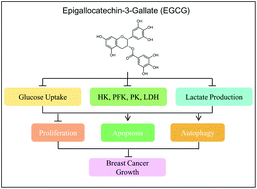当前位置:
X-MOL 学术
›
Food Funct.
›
论文详情
Our official English website, www.x-mol.net, welcomes your
feedback! (Note: you will need to create a separate account there.)
Suppressing glucose metabolism with epigallocatechin-3-gallate (EGCG) reduces breast cancer cell growth in preclinical models.
Food & Function ( IF 5.1 ) Pub Date : 2018-10-12 00:00:00 , DOI: 10.1039/c8fo01397g Ran Wei 1 , Limin Mao , Ping Xu , Xinghai Zheng , Robert M Hackman , Gerardo G Mackenzie , Yuefei Wang
Food & Function ( IF 5.1 ) Pub Date : 2018-10-12 00:00:00 , DOI: 10.1039/c8fo01397g Ran Wei 1 , Limin Mao , Ping Xu , Xinghai Zheng , Robert M Hackman , Gerardo G Mackenzie , Yuefei Wang
Affiliation

|
Numerous studies propose that epigallocatechin-3-gallate (EGCG), an abundant polyphenol in green tea, has anti-cancer properties. However, its mechanism of action in breast cancer remains unclear. This study investigated the capacity of EGCG to suppress breast cancer cell growth in vitro and in vivo, characterizing the underlying mechanisms, focusing on the effect of EGCG on glucose metabolism. EGCG reduced breast cancer 4T1 cell growth in a concentration- (10–320 μM) and time- (12–48 h) dependent manner. EGCG induced breast cancer apoptotic cell death at 24 h, as evidenced by annexin V/PI, caspase 3, caspase 8 and caspase 9 activation. Furthermore, EGCG affected the expression of 16 apoptosis-related genes, and promoted mitochondrial depolarization. EGCG induced autophagy concentration-dependently in 4T1 cells by modulating the levels of the autophagy-related proteins Beclin1, ATG5 and LC3B. Moreover, EGCG affected glucose, lactate and ATP levels. Mechanistically, EGCG significantly inhibited the activities and mRNA levels of the glycolytic enzymes hexokinase (HK), phosphofructokinase (PFK), and lactic dehydrogenase (LDH), and to a lesser extent the activity of pyruvate kinase (PK). In addition, EGCG decreased the expression of hypoxia-inducible factor 1α (HIF1α) and glucose transporter 1 (GLUT1), critical players in regulating glycolysis. In vivo, EGCG reduced breast tumor weight in a dose-dependent manner, reduced glucose and lactic acid levels and reduced the expression of the vascular endothelial growth factor (VEGF). In conclusion, EGCG exerts an anti-tumor effect through the inhibition of key enzymes that participate in the glycolytic pathway and the suppression of glucose metabolism.
中文翻译:

用表没食子儿茶素-3-没食子酸酯(EGCG)抑制葡萄糖代谢可减少临床前模型中乳腺癌细胞的生长。
大量研究表明,表没食子儿茶素-3-没食子酸酯(EGCG)是绿茶中一种丰富的多酚,具有抗癌特性。但是,其在乳腺癌中的作用机理仍不清楚。这项研究调查了EGCG在体外和体内抑制乳腺癌细胞生长的能力,对潜在机制进行表征,重点关注EGCG对葡萄糖代谢的影响。EGCG以浓度(10–320μM)和时间(12–48 h)依赖性的方式降低了乳腺癌4T1细胞的生长。膜联蛋白V / PI,caspase 3,caspase 8和caspase 9激活证明,EGCG在24 h诱导乳腺癌细胞凋亡。此外,EGCG影响了16个凋亡相关基因的表达,并促进了线粒体去极化。EGCG通过调节自噬相关蛋白Beclin1,ATG5和LC3B的水平,在4T1细胞中诱导自噬浓度依赖性。此外,EGCG影响葡萄糖,乳酸盐和ATP水平。从机理上讲,EGCG显着抑制了糖酵解酶己糖激酶(HK),磷酸果糖激酶(PFK)和乳酸脱氢酶(LDH)的活性和mRNA水平,丙酮酸激酶(PK)的活性较小。此外,EGCG降低了缺氧诱导因子1α(HIF1α)和葡萄糖转运蛋白1(GLUT1)的表达,这是调节糖酵解的关键因素。在体内,EGCG以剂量依赖性方式降低乳腺肿瘤的重量,降低葡萄糖和乳酸水平,并降低血管内皮生长因子(VEGF)的表达。总之,EGCG通过抑制参与糖酵解途径的关键酶和抑制葡萄糖代谢发挥抗肿瘤作用。
更新日期:2018-10-12
中文翻译:

用表没食子儿茶素-3-没食子酸酯(EGCG)抑制葡萄糖代谢可减少临床前模型中乳腺癌细胞的生长。
大量研究表明,表没食子儿茶素-3-没食子酸酯(EGCG)是绿茶中一种丰富的多酚,具有抗癌特性。但是,其在乳腺癌中的作用机理仍不清楚。这项研究调查了EGCG在体外和体内抑制乳腺癌细胞生长的能力,对潜在机制进行表征,重点关注EGCG对葡萄糖代谢的影响。EGCG以浓度(10–320μM)和时间(12–48 h)依赖性的方式降低了乳腺癌4T1细胞的生长。膜联蛋白V / PI,caspase 3,caspase 8和caspase 9激活证明,EGCG在24 h诱导乳腺癌细胞凋亡。此外,EGCG影响了16个凋亡相关基因的表达,并促进了线粒体去极化。EGCG通过调节自噬相关蛋白Beclin1,ATG5和LC3B的水平,在4T1细胞中诱导自噬浓度依赖性。此外,EGCG影响葡萄糖,乳酸盐和ATP水平。从机理上讲,EGCG显着抑制了糖酵解酶己糖激酶(HK),磷酸果糖激酶(PFK)和乳酸脱氢酶(LDH)的活性和mRNA水平,丙酮酸激酶(PK)的活性较小。此外,EGCG降低了缺氧诱导因子1α(HIF1α)和葡萄糖转运蛋白1(GLUT1)的表达,这是调节糖酵解的关键因素。在体内,EGCG以剂量依赖性方式降低乳腺肿瘤的重量,降低葡萄糖和乳酸水平,并降低血管内皮生长因子(VEGF)的表达。总之,EGCG通过抑制参与糖酵解途径的关键酶和抑制葡萄糖代谢发挥抗肿瘤作用。











































 京公网安备 11010802027423号
京公网安备 11010802027423号